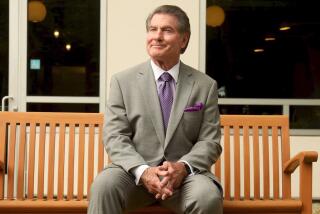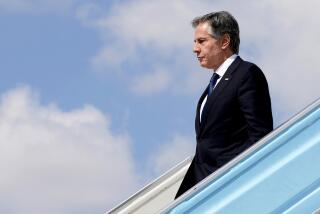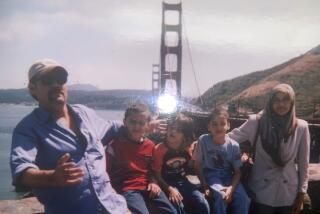‘Catalyst’ for Ethiopian Airlift Disclosed : Robbins, Publisher Claim Valley-Spawned Plan Spurred U.S. to Action
A plan for a privately financed rescue operation mounted from the San Fernando Valley to save starving Ethiopian Jews in the Sudan was “the catalyst” that spurred the U.S. government’s clandestine airlift last week, a state legislator and the publisher of an Encino-based Jewish newspaper claimed Monday.
The airlift followed a secret appeal to President Reagan by all 100 U.S. senators to save the Ethiopians.
State Sen. Alan Robbins (D-Van Nuys) and Phil Blazer, publisher of the newspaper Israel Today, said they were within 36 hours of sending a chartered 747 jetliner into the Sudan for the Ethiopians in January when the State Department asked them to cancel their plans.
Blazer’s public relations representative, Hal Sloan, said he “went in undercover” to the Sudan in January, pretending to be a location scout for a film company, to make arrangements with the Ethiopian Jews, known as Falashas.
Sloan said he paid out money, including some from a $5,000 contribution by celebrity hair stylist Vidal Sassoon, in bribes to Sudanese officials to pave the way for the rescue. The Falashas were to have been brought first to the United States, then sent to Israel in small groups, Blazer said.
Plan Served as ‘Catalyst’
Although the rescue attempt was never made, Blazer said, he believes that the U.S. airlift came about in part because “this was some sort of catalyst--the threat” of private action.
“Phil was assured that, if we didn’t do it, the government would,” Robbins said.
On Friday U.S. Air Force C-130s flew more than 500 Falashas from a refugee camp in eastern Sudan to Israel.
Blazer said that in retrospect he was glad the government carried out the project because he is now convinced the private plan would have failed.
Blazer said his group dubbed their plan “Operation Joshua,” because it would have followed “Operation Moses,” which secretly ferried about 7,800 Falashas to Israel between Nov. 21 and Jan. 6.
The airlift ended--threatening to doom the remaining Falashas to starvation in squalid desert refugee camps--when it became known, apparently because the publicly pro-Arab government of Sudanese President Jaafar Numeiri was embarrassed by the revelation that it was cooperating with Israel.
In the Old Testament, Blazer said, “Joshua took over from Moses to bring the Jews to the promised land” of Israel.
Blazer said “Operation Joshua” was to have been financed with up to $300,000 in contributions from Robbins and Michael R. Goland, a secretive Valley millionaire.
Goland, who is active in Jewish causes, recently spent more than $1 million to defeat Sen. Charles Percy of Illinois, former chairman of the Senate Foreign Relations Committee. Percy supporters charged Goland’s unusual campaign was retaliation against Percy for Percy’s vote to sell sophisticated surveillance planes to Saudi Arabia. Goland denied the accusation.
Robbins said he planned to finance the airlift with donations or loans from his reelection campaign committee.
Expected Reimbursement
“Advance publicity would have killed the project,” because of the Sudanese government’s worries about losing face before other Muslim countries, he said. But he expected his committee to be “reimbursed by the Jewish community of Los Angeles” in a fund-raising drive after the rescue was completed, and that Goland would make up any deficit.
Goland’s attorney, Marshall Grossman, said Goland “is a private citizen and has no inclination to comment on that.”
Robbins said “Operation Joshua” was born over a lunch at Tracton’s restaurant on Ventura Boulevard when he and Blazer, who are both Jewish, became angry that “nobody’s doing anything about the Falashas . . . all these people who had done nothing wrong were starving to death.”
“Clearly planes flying the Israeli flag couldn’t take them out, but a plane flying the American flag could,” Robbins said. He said he and Blazer asked each other, “Why don’t we just get a 747 and fly over and pick up a planeload?”
Arrangements were made to charter a plane from Trans-American Airlines of Minneapolis and fly to the Sudan by way of Athens to pick up 460 Falashas, he said. A medical team was assembled “and at one point we were within 36 hours of taking off,” Robbins said.
He planned to go on the flight, Robbins said, “because if there was trouble, presumably the United States would not abandon an elected U.S. official to swing in the breeze and the military would come rescue the plane.”
He said Sudanese officials not only cooperated but expedited a visa for him when he told them he wanted to go to the Sudan “for the purpose of assisting refugees in leaving the country.”
Met With Vice President Bush
Blazer said that, after suspending “Operation Joshua,” he and representatives of the American Assn. of Ethiopian Jewry met in February with Sen. Alan Cranston (D-Calif.) and Vice President George Bush. He said he gave Bush a book that charges the United States abandoned European Jews to the Nazis in World War II.
Bush was picked because he was soon to visit Numeiri in the Sudan and “because he was (formerly) the director of the CIA,” Blazer said.
Cranston became the prime force behind a secret petition to President Reagan, signed by all 100 U.S. senators, asking Reagan to “take steps to ensure swift resumption of the airlift. Cranston gathered the signatures of more than 80 senators himself, said Cranston’s press secretary, Murray Flander.
Sen. Alfonse D’Amato (R-N.Y.) gathered the others.
“In fact, the senators were so eager to sign, they got 106 signatures because some of them signed both” Cranston’s and D’Amato’s copies of the petition, Flander said.
The letter was delivered to Reagan Feb. 21, and, on Feb. 26, Reagan and Bush telephoned Cranston to assure him that “they were paying attention to it,” Flander said.
Blazer said he had advance “indications that something was happening of the nature of what happened last Friday,” but that “I purposely did not ask many questions” because he planned to keep such an operation a secret.
More to Read
Sign up for Essential California
The most important California stories and recommendations in your inbox every morning.
You may occasionally receive promotional content from the Los Angeles Times.










